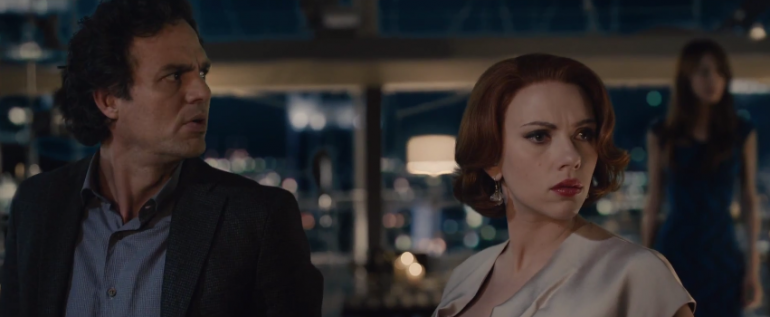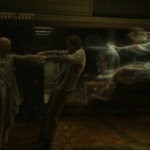‘Avengers: Age Of Ultron’: Black Widow Bashing

Caution: Generally I try to avoid spoilers, but this piece must involve a few.
Some critics are hell-bent on reading ill motivations into Marvel/director Joss Whedon and others by condemning Avengers: Age of Ultron for Black Widow’s role in the superhero story.
In the film Natasha (Black Widow) and Bruce Banner compare notes about their dark sides.
Bruce: I can’t have this. Any of this. There is no place on Earth I can go where I’m not a monster.
Natasha (about her assassin training): You know what my final test was in the Red Room? They sterilized me. Said it was one less thing to worry about. You think you’re the only monster on the team?1
I had a feeling this moment would be controversial.
For example, one critic complained, “Haven’t we gotten to a point where the one lonely female superhero in our current landscape can just pursue the business of avenging without having to bemoan not being a mother?”
At The Washington Post, Alyssa Rosenberg gives a deep, balanced, yet devastating rebuttal.
Marvel’s critics aren’t wrong that the franchise has been oddly slow to put women at the center of its movies. But this line of criticism, or Jen Yamato’s contention that the films have treated Black Widow like nothing more than a cheap temptress, seem to me to miss the mark.
 Rosenberg quotes a description of one strong woman “who burrowed into her work, kept secrets, shopped with glee, cooked with flair, and tenderly looked after her friends’ kids.”
Rosenberg quotes a description of one strong woman “who burrowed into her work, kept secrets, shopped with glee, cooked with flair, and tenderly looked after her friends’ kids.”
And ultimately that’s a great deal of what I want from my female action heroes: that they not be required to take off their femininity when they suit up for battle, and that they not be required to leave it hanging in the closet when they return from the wars. Certainly, there are some female characters for whom violence may be straightforward and have few other implications for their senses of self. But isn’t the whole point of having women as well as men be superheroes and swordfighters that they bring a new range of perspectives to our experiences of these very old stories?
Some critics, of course, took to Twitter with vengeful rage. And Joss Whedon left in protest.
Later Whedon observed about the fanboy rage as well as the “social justice warrior” rage:
I have been attacked by militant feminists since I got on Twitter. That’s something I’m used to. Every breed of feminism is attacking every other breed, and every subsection of liberalism is always busy attacking another subsection of liberalism, because god forbid they should all band together and actually fight for the cause.

The Avengers know when to revel. I’m not sure perpetually outraged fanboys or “SJW” critics do.
Perhaps Whedon misses that for some folks (on Twitter and elsewhere), attacking is the cause. When you live for the battle as a means to its own end—when conflict itself is your “paradise”—you have no standard of victory or what Thor would call “revels.”
I can’t help but make a few casual and necessarily very-generalizing remarks about this.
First, this may confirm that unregenerate folks—who remain “dead in trespasses and sins” (Ephesians 2:1)—don’t have the long-term capacity even for simple pleasures. Something new comes along and we love it, start the fandoms, get hyped, share excitement with others. But it can’t last. Even with small gifts, eventually our Me-ism and desire to abuse storytelling and Art and all that trumps even our honest popular-culture enjoyments.
It’s not that these things are necessarily bad. It’s us who are bad. We’re not big enough for even these tiny gifts. How much more infinitely too small are we to enjoy the Giver. That’s why something must change. He must bring us to life and start making us bigger so we have capacity for Him. Only then can our view of His gifts be transformed (1 Tim 4:1-5).
Second, some critics are apparently opposing simple pictures of human weakness. So is it oppressive to show Black Widow crying? Or suffering? Or in any kind of vulnerability?
Third, I would go so far as to say this demonstrates a possible desire to place moral-agenda over story. In the minds of some who call themselves “social justice” activists, there is no joy, no peace, no fun, and no simple pleasure. There is only The Cause. If we cannot picture a world in which all unjust enemies are gone and leave only beauty, truth, and goodness to enjoy, even a secular version of Heaven is impossible—a cosmic square circle. How much more inaccessible would be God-centered true eternity?
Fourth, we need to stop being so legalistic and uncharitable about stories and their makers. Even some of the best “social justice” critiques of this scene and its supposed insidious motives are far worse than the worst fundamentalist Christians’ pop-culture criticisms. They do not presume the best about the story-makers or even care to ask what they meant.
As one internet acquaintance informally remarked:
I saw the movie and I picked up on a few of the moments that people are angry about, but I just interpreted them differently. Like when Natasha’s character thinks she’s a monster for being sterile, the message I got was that she had a wrong view of herself, but that love could help heal and show her the truth (ie show her that her identity is NOT in her fertility). I certainly never felt the message to be that sterile people are actually monsters. To get that impression is to interpret each character’s feelings as the literal intended message and belief of the story-writer, which is the dumbest, most asinine, flat-minded thing a person could do.
Another friend said:
This is one of the main problems with the internet: people suck at hermeneutics. Their emotions, stories, histories, limited comprehension become the ultimate and immediate standard by which a piece is to be judged. No patience, no interpretive charity is shown.
Or ponder this wisdom from James Gunn, director of Guardians of the Galaxy:
As a young person I was very angry, and it’s something I have worked on, both personally and through years of therapy. And if I can say one truth about anger, it is that anger is almost never anger. Anger – especially aggressive and abusive anger – is a way to deal with feeling insecure, sad, hurt, vulnerable, powerless, fearful, or confused. Those feelings, for many of us, are a lot more difficult to deal with and acknowledge than anger. Anger makes us feel “right”. And powerful. But it also usually exacerbates whatever the underlying, more uncomfortable feeling is.
I had to respond with an example from Gunn’s own story (“trigger warning”: bad word).
Drax says, “I just wanted to tell you how grateful I am that you’ve accepted me despite my blunders. It is good to once again be among friends. You, Quill, are my friend. … This dumb tree is also my friend. … And this green whore is also …”
Gamora irritatingly shushes him, but then when Nebula appears to (in Drax’s view) insult Gamora even worse, he blasts the heck out of Nebula.
Drax: “No one talks to my friends like that.”
Not to “juke” this moment full of awesome, but I think this scene goes a long way to illustrating something about human nature: Yes, often we use words intentionally. Other times we don’t mean to do this at all; instead we are naive (or metaphor- or vocabulistically-challenged) and would actually die (or raygun-blast) to protect the friends who would have taken offense at something we thoughtlessly said.
So keep this in mind, in this and any other internet comments section—or their real-life equivalents—that words mean things, but sometimes speakers mean differently. Let’s keep that in mind especially if we get into fandom-fights or other disputes over Age of Ultron!
- May 13 correction: An earlier version of this article relied overmuch on a scene quote posted at IMDB, which substituted the correct term “monster” with the incorrect term “loner.” ↩











































The thing about being female is that you can never win; there will always be someone to put down your decisions or your accomplishments. But Black Widow’s tragedy was that she wasn’t permitted to choose: the decision was forced on her.
I myself wouldn’t mind being sterilized: I don’t want babies now and I will probably never want babies. I don’t like children. But there are plenty of people who would think this monstrous of me or that I’m somehow transgressing against my femininity or some shizz. There are people who would say that I’m not capable of “real” or “true” love because I don’t wanna push a watermelon through a garden hose or nail Jello to the tree of toddlerhood, and I’ve actually seen more of those than of their radfem opposites in my journeyings on teh interwebs (though it could be just because mommybloggers are legion).
Exactly. This was a violation against her personhood. The point is not that she’s less of a person because she can’t have children. The point is that someone else violated her and forced her not to be able to do this if she chose to do it. Even worse, they forced her into a life of assassinations for a cause she may or may not have agreed with — the equivalent of slavery.
Folks are not understanding this, either ignorantly or willfully. They are reacting to this story with the exact gentle criticism known among fundamentalist Churchians in response to Harry Potter. But with Age of Ultron the Christian fans absolutely get it.
This was a really good article. I haven’t seen the movie yet, but I heard that the SJWs were going berserko over it. It’s nice to know that Whedon treated his female character like a woman, with female desires. I think that’s what the feminists hate so much–they can erase every other part of their womanhood, but what do you do with the children?
That’s some good writing right there.
??????????? Feminism isn’t the same thing as being genderqueer or transgender. Am I an Unwoman for not wanting children? Or does that make me an honorary man?
I don’t know. I mean, a lot of second-wave feminists in particular have defined themselves in term of traditionally male roles: career-focused, dominant, child-eschewing and child-disdaining. If you aren’t careful, you can think “equal” is being “male,” and suppress part of yourself in the pursuit of that. They disdain housewives and female work (including children) in the same way some men do, and they seem to want to emulate bachelor uncle Fred, down to the casual sense and the creeping sense of unfulfillment.
The third wave notices this, but I don’t think they know what to do. They want to try to get the best of both worlds, but it may be a case where it’s impossible to do so. I don’t think a woman is less of a woman if she chooses such, but it may be a case where you have a “male” or “female” spectrum (labels only) where you put yourself on. “male”=leader, career focused, less kids. “female”=home focused, less career, etc. You want the career, you wind up with one kid in daycare at age 35, or none at all.
Purely a “secular” response here: I believe true feminism would hold that whether or not you believe in “traditional female roles,” you ought to at least have the freedom to choose. In a free society one should be stigmatized either for choosing to have children or choosing not to have children.
A more-biblical response: God loves children and families and endorses them whole-heartedly, including the oft-ignored God-love-imaging practice of adoption. (cf. Romans 8:15). But the overall thrust of the Scripture is about discipling and training spiritual children (cf. the Great Commission), which includes but is not limited to one’s own physical children. Moreover, the jury is (at best) out on whether children will continue as children into the New Heavens and New Earth, the God-centered eternity the saints of Jesus expect.
I think there is a subset of feminism that are the bra-burners and so on of old that are kinda misandrist or against all differences in the genders. I don’t think that’s you notleia or most feminists, especially today.
I don’t think for you to choose to have yourself sterilized in a position of comfort and power is wrong. I do think that to be compelled or cajoled into doing so is abhorrent. That was BW’s case. Also, I think that it is easy to see things we regret and think we are a monster. I can relate to her in my own stuff as a guy who was in the sandbox.
“In the sandbox”? I am not familiar with that turn of phrase.
I’ve yet to see BW’s line in context, but I think it’s been done well before, some deadly female character lamenting about how all she produces is death and destruction and never life (Rogue from X-Men, maybe, probably?). Or maybe several different deadly female characters, but in any case, it can be done well, so if they botched it, let’s go tar and feather Whedon’s mailbox.
TBH i’m not a fan of black widow at all. To me she’s always been a boring generic character in the films: a femme fatale with the fatale part stripped off. The avengers movies bowdlerized the original Ultimates books they were based on, and to me it would have been better to have hank and janet pym instead of her.
I think the sterility was handled poorly mostly because Widow also is just a guy with breasts. I mean that she’s a male template played by a female. What’s ironic in the films is that instead of her, Hawkeye is the female template played by a man, and they could have switched the genders and achieved the aims a lot easier.
I don’t know why they didn’t have the two as a couple. I mean, the Hulk is a ridiculous choice for a romantic entanglement: he’s the personification of male rage and capacity to harm others, and he knows and understands that. Hawkeye started out as the wounded warrior the Widow could heal, and it puzzles me why they abandoned that.
You’re wrong about Black Widow though. She’s become more than a shooting-up heroine, and organically so; she is not simply a male action hero with curves. Age of Ultron proved yet again that she’s a bit more realistic and human than that, while still behaving like any hyperbolized action-film action-hero.
Only in Iron Man 2 is Black Widow more stereotypical for her debut. The Avengers gave her much more to do rather than simply being “one for the women.” Natasha fetches Bruce and confronts the one enemy whom she actually legitimately fears. She confronts Loki and manages to “seduce” him not in the traditional way but with her feigned tragic fears. And she holds her own in the battle of New York. All of this is accomplished in a totally organic way — there is not a smidgen of a sense of Ha ha haaa, look at we’re doing with this action-hero character except IT’S A GIRL WHO IS STRONG so aren’t you pleased?
This organic and very human approach to her continues even more in Captain America: The Winter Soldier even before Age of Ultron carried her personal story further. In fact, Natasha’s story arc is one of the best of the MCU so far.
Sorry notleia, I was using a colloquialism. If a military or vets use that term or talk of the “sandbox”, they mean Iraq or Afghanistan. I have poor self-esteem and disconnectedness among others, due to my time in the sandbox (Iraq). It’s easy to view things as bad for us or by us, and so on in situations like that.
Oh, gotcha.
The objection to the Black Widow lamenting her forced sterilization, even to the point of tears, infuriates some because our society has lost its view on what classic femininity is.
Let’s start with the fact that woman and men are different. Shock, I know. …I once mentioned in casual conversation that a woman’s body is designed to have children. You cannot imagine the shocked expression I got in return. Oh, horror of horrors, what a beast I must be, right?
Yet, that statement is as controversial as saying a bird’s body is designed to fly.
This is where we are. What popular society has done is devalue the ACTUAL strengths and function of the female of our species, and replaced them with the strengths and functions of the male of our species. (But, it has gone further by mocking and resenting those male qualities in males, and forcibly replaced them with female qualities. Insane.)
The strengths of a woman are different from those of a man, but God forbid we mention that. Women are naturally nurturing- the exception of “notleia” not proving the rule, of course- which only makes sense because they are the ones who create and bear the next generation. It makes sense that the hardware would have the proper software in order to function properly, yes? …The Black Widow coming to tears for being forcibly stripped of her ability to raise children (essentially being raped) makes sense. It is natural, in every sense of the word. …Probably one of the only natural things about the character.
But we have actually fooled ourselves into thinking that a woman can best a man in the area of his own strength at any time. (In the area of her own strengths, as well.)
That’s both laughable and sad.
I agree with your comment — except for your dig at commentator NotLeia, because it was rude. This piece at ReelWorldTheology titled Black Widow: Heroism in Many Forms would also agree:
Was it rude? Really? How so?
I read your mention as a claim that she is not caring or nurturing. I think this is unfair, especially since even people who sound disagreeable (or even mean) on the internet are often showing a side of themselves that isn’t true in reality.
Please, however, let me know if I’ve read your remark uncharitably.
My point was that one of the great feminine strengths is nurturing, and it has been my experience that people often times try to use the exception to prove the rule.
“Notleia” said of herself: “I myself wouldn’t mind being sterilized: I don’t want babies now and I will probably never want babies. I don’t like children.”
This is almost the anti-thesis of nurturing, is it not? “Notleia” is the exception to the rule, and given that she has commented a few times in this thread I thought I’d mention it.
It wasn’t a cheap shot, or chance to flex my rudeness muscles. I thought it was applicable to the conversation.
No harm meant.
This is pretty weird, other people (especially ones who don’t know me particularly well) debating over my femininity.
The point is that I have double X-chromosomes but no particular desire for children. Do my X-chromosomes make me female, or does my lack of desire for progeny cancel that out? Am I Unwoman? Am I not even human if I don’t fit into your neat little box?
Can Steve even imagine how my potential dehumanization might be considered rude? So many questions.
Please, don’t over-exaggerate.
I merely said- proving by your own words- that your description of yourself shows that you are not a nurturing type of person. You don’t have the desire to raise and comfort children. And I was pointing out that nurturing is one of the many strengths characteristically of being female.
I didn’t say you were NOT a woman, or NOT a human. I didn’t put you in a box of any kind. I merely quoted your own words as an example.
And was it rude? No. I don’t think so. There was nothing rude about it.
If you’d like to discuss this further that’d be great but please, don’t put words in my mouth. Thanks.
Then I’m confused as to what your point is. Is this about what women should be like, or what women are like? Don’t conflate socialized gender expectations with how people “really” are. I’m not that rare, as a woman who doesn’t want children. Go google “childfree.”
No, my point is that men and women are different. We have opposite yet equal strengths.
It is a shame that our current culture downgrade the importance of the nurturing aspect of women. My God, it is intended to raise the next generation, for crying out loud. It keeps the species going. Why on earth would we refuse to recognize and celebrate that?
But that’s how it is. My wife, for instance, was a fashion designer. When we were expecting our first it was fully her intention to leave her “work” and raise her child. In her mind making clothes paled in comparison to raising a human being, but the reaction from her co-workers was staggering. “You’re wasting your life” they told her. They even joked behind her back.
How horrible is that? What greater way to celebrate life than to sacrifice your own ambitions (if indeed they are) and pour your soul into a child?
But that’s where we are.
This is not mere “socialized gender expectations”, Notleia, this is the history of the entire human species. Woman were given the physiology to bear children as well as the emotional/soulish capacity to raise them. The attachment of a mother for a child is the height of human beauty because it promises a future.
Where we do see “socialized gender expectations” is in the insistence of the popular culture in forcing masculine strengths on women. The idea that the Black Widow can take down Hawkeye, for instance, is laughable. Not only are they equally trained (arguably) and equally lethal, but Hawkeye has about 100 lbs of trained muscle on top of that. But yet, we not only believe she can take him down in physical combat (a natural result of a masculine characteristic), but we will cry foul if she doesn’t.
No, you may not be rare in the Western world- U.S. and European rates of childbirth are dropping steadily- but in the rest of the world you are. And when looking back through history throughout every culture in every corner of the world, you absolutely are.
That doesn’t make you less feminine, or less human. It’s ridiculous to even assert. It just makes you different. That’s all. No more. No less.
But the fact that you are who you are in NO WAY changes the nature of femininity. I only mentioned you in my first comment because I have seen an attempt at that argument FAR TOO MANY times before.
Cool?
———–
(Oops. Started a new conversation instead of replying. Sorry.)
Yeah, women are different from men. But women are also different from other women, and men are different from other men. There are men who are nurturers and shouldn’t be glossed over. You can make broad generalizations about the difference in capacities for men and women, but there’s a huge amount of overlap that makes those generalizations pretty worthless.
And for most of human history, women haven’t had a choice about whether to reproduce. It’s developed countries that have a lower birthrate because they have access to reliable birth control. If women in less developed countries had the resources and therefore the option, would they have as many children or even children at all?
Is there an concept of femininity that’s universal? It could be argued, but it’d have to be a pretty vague one to overcome the variations on cultural expectations. But it’s still an ideal, not a reality.
Also, it’s pretty creepy how much some people conflate motherhood with martyrdom. Do/Should women only exist for the sake of their families? If that’s true, then women are not valuable in of themselves, and that’s pretty dehumanizing.
I tried to make an edit, but I dunno if I managed it before time ran out, so here it is again:
PS: I know you’re not making all of the assumptions that I’m addressing, but I think it’s pretty clear that you haven’t thought through the implications of this gender essentialism that you’re promoting.
Of course to say that X is a feminine trait or Y is a masculine trait is not to say that all women and men are those things. That just goes without saying. But there is no question that throughout the history of mankind inherent characteristics between the genders show themselves glaringly in ever culture and every tribe in every corner of the world.
The fact that a particular woman may be physically stronger than a particular man, or a particular man may be a more nurturing parent than a particular woman isn’t in any way an argument against those universal characteristics that are seen throughout the entire existence of the human race.
As for birthrates… you cannot assume that because you feel no impulse to have children that other (or most) women, given access to birth control or free to follow their “opinions” would choose as you do. The desire for children- to continue the species- is strong in BOTH men and women. It has to be. It’s part of our survival.
I know women who have chosen to be childless, but by far most women I know do indeed feel the need to have a child as they grow older. In fact, when first married my wife and I were dead set against having kids. Fast forward 20 years and we have two beautiful kids, and we are now playing with the idea of adopting.
There is no way you can assert that women would even play with NOT having children at all given that they had our culture. That goes against EVERYTHING we see in life today, and in human history. In my opinion, that not only is projecting yourself, but it is not reality.
How femininity and masculinity is expressed may differ from culture to culture, but the inherent properties are there in all. There is simply no denying it.
As for conflating motherhood with martyrdom… in a very strong sense, it is. As is fatherhood. As a father I have given up my dreams to some degree, and willfully submitted my life and efforts to providing for, and raising my family. That is the very nature of parenthood. Its foundations are built on sacrifice.
If a parent can achieve BOTH his/her dreams AND care for their family, then that’s gravy. But, my dreams come in a far, far second compared to making sure my family is warm and fed. I have given my life to them. Call it martyrdom if you like.
And yes, I have thought this through. But the truth is only in this culture, in this day and age, do we see folks denying the very essentials of human nature that have kept the species going, and simply asserting that things aren’t what the have always been.
It’s kind of amazing, really.
Well, the easy way to resolve the question about women in underdeveloped countries and their wants and opinions on childbearing and birth control is to go ask them, but neither of us has the resources for that.
So if I grok you, this is about some theoretically universal idea of femininity. On the other hand, if you don’t actually care if women adhere to that narrative proscribed by that theory….then what? Do you just want acknowledgement that this theory of universal femininity is a Thing? Okay, it is a Thing, but it has a boatload of horrible baggage attached to it. Appealing to tradition is not actually a great argument.
Again, I think you’re projecting. Because you feel a certain way you think all women do, but you’re wrong. It varies from culture to culture but views on motherhood are vastly different from your own. And this is no appeal to tradition, but a simple surveying (and acknowledging) of human history. This is beyond traditional.
And what you are also not getting is that the desire to reproduce is not so much a cultural thing, or a societal construct, but a HUMAN THING. Male AND female. It is a human drive. (In fact, it is one of the 3 main drives: eat, sleep, sex.)
It is not something that is forced on us. It is something we ARE. Similarly, our maleness and femaleness is something we ARE, and they carry certain universal characteristics.
You tend to see that as containing “horrible baggage”, and I think that says a lot about how you feel about things.
…And I have no idea at all what it means if you were to “grok me”, but there y’go.
There’s always something new to learn, I suppose.
And you aren’t biased and/or projecting? Uh-huh, yeah, because dudes are automatically completely rational and are never capable of skewed perceptions. Silly me.
Brov, all I’m wanting here is a little acknowledgement that non-child-oriented people like me exist and that is okay. And that we aren’t ruining anything, nor destroying civilization. And that it is not okay to make sexist assumptions about people like assuming women are child-oriented because ovaries. Can we agree to that?
I don’t think I am projecting. I am taking human beings as they are. I’m a student of art, and I see in all places and ages- from African figures, to Taino stone carvings, to Greek pottery, to Egyptian hieroglyphs, to Japanese prints, to European paintings, and on, and on, and on- the roles and characteristics of the sexes being displayed distinctly and consistently, and being celebrated for what they are.
I see what is out there, and I let it speak for itself.
But, I’m sure I have my skewed perceptions in other areas. Hip-hop music stinks on ice. I could be wrong, but I don’t think I am.
As for acknowledging the existence of folks like you, and giving you my “okay”- like I’m sure that matters to you… didn’t I already do that?
Here’s what I said: “That doesn’t make you less feminine, or less human. It’s ridiculous to even assert. It just makes you different. That’s all. No more. No less.”
You are made in His image just like me. You have your preferences. I have mine. It’s all good. And for what it’s worth, in NO WAY do I look down on you or consider you less that equal to me.
You aren’t ruining anything. You’re part of the human tapestry, and I find it all very interesting.
Peace to you, “Notleia”. Have a good one.
To me that sounds like a good discussion-ender.
I also believe I must recuse my “that’s rude” comment. My apologies for my judgment. Thanks for explaining more, Steve C.
I’ve read this whole discussion, though without comment until now. For now I’ll only suggest again that so long as two participants are approaching from two entirely different points of view — that is, without a shared belief about where human dignity comes from and Who gives it, and how we often reject our own dignity or twist it into something it’s not — we’re only doomed to butt heads.